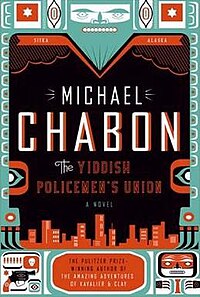Another late review: The Yiddish Policeman's Union
 It took me a long time to get into Chabon's The Yiddish Policemen's Union
It took me a long time to get into Chabon's The Yiddish Policemen's Union. For the first half of the book I was struck by the author's imagination—an intriguing, vaguely plausible alternative universe leading up to our time such that many things were the same, and a few, including the local slang in this Yiddish outpost in Sitka, were richly different.
But, being clever with language isn't enough. Gradually, the detective story became more exciting, although the ending seemed a bit chaotic. I can't imagine what people who don't know Jewish history and culture read from the book. I don't know how the hints that the book was more than just another interesting curiosity, a Tzadik of the Seven Wonders for our time, came through to readers who haven't read the Hailblum, or more important in this context, who don't see the way in which Chabon has not only woven Jewish possibility into his alternative universe, but also woven an essay on modern, very real, Jewish history into the book, rejecting the Messianism that affects much of modern Jewish identification, and coming down to that very American Jewish—that very American idealist of conclusions: In the end, we have only ourselves on whom to rely, and that must be enough.
There is so much here about how basic human decency strives with fear and hope. In the end, this strange, wonderful tale is about love. That too, is good. What is even better, is that unlike current writers such as Jonathan Safran Foer, Chabon seems to have some awareness of Jewish history and culture.
There are few musicians in the story (this is where I justify posting about this book to the KlezmerShack), but in affirming the best of the web of influences that are part of the lives of Jewish-identified Americans, they are usually klezmorim. The story would be equally good, if it concerned an exile of Sephardic or even post-first-exilic community with other music. What is important is that the music, while also informed by pop American culture, is, like the rest of the book's roots, organically part of Jewish culture.
When I read The Fabulous Adventures of Cavalier and Clay I was struck by how Chabon was writing at an another generation's remove from the Holocaust, choosing to remember it and to make it real for his generation, but also informed by a culture that much more assimilated into American culture than was true when I was young the survivors included parents of my friends. The same is true, if on a bigger canvas, for the The Yiddish Policemen's Union. Both works are ultimately wonderful stories on their own terms, but even more wonderful as one digs into the symbolism, the rich Jewish yikhes, and considers them as great new North American Jewish writing (I say "North American" rather than "American," because I would also include writers such as Toronto's Ann Michaels in that small group). I cannot recommend this book too highly, It is marvellous. And it is a book that is rooted in both Yiddish and American culture in ways that are even more extraordinary. Hazak. Hazak. Hazak.